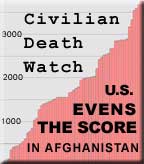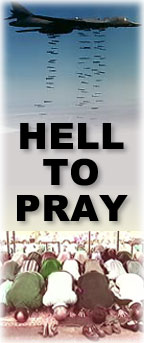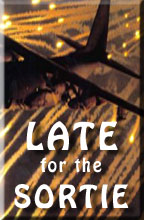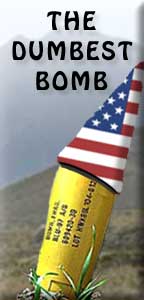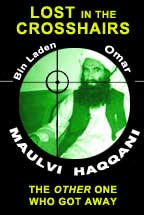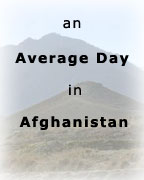Postmodern Gestures of [in]Significance:
Proclaimed U.S. Air Supremacies Over Afghanistan
by Marc W. Herold
"This is the ultimate post-modern war. The actual theatre of operations is the realm of symbols, and the target is people's minds—their very innate capacity to reason and question. In every modern war, propaganda has been deployed in the service of military objectives. In this war, military operations are not even in the service of propaganda: they are the propaganda."1
POSTED APRIL 25, 2002 --
On Tuesday, October 9, 2001, just two days after its attack upon Afghanistan had begun, the United States in a gesture of comical overkill proclaimed "air supremacy" over Afghanistan. Over what? The offensive capability of the Taliban Air Force comprised 15 aged fighter jets - five MIG-21MF 1960s era craft and 10 Sukhoi-22 fighter-bombers dating back to 1972.2 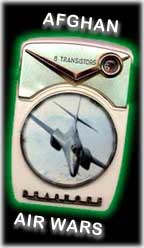 These planes when able to take to the air—scanty maintenance permitting—were flown by pilots from communist regime times of the 80s who were not even trained to fly at night.
These planes when able to take to the air—scanty maintenance permitting—were flown by pilots from communist regime times of the 80s who were not even trained to fly at night.
The Taliban possessed a few SAM missiles whose sites were quickly disabled during the first 24 hours and an array of anti-aircraft batteries capable of firing 2,000 meters upward and shoulder-held missiles incapable of reaching higher than 10,000 feet. Yet, on October 9th, and with much fanfare, both General Myers and Defense Secretary Rumsfeld claimed "air supremacy over Afghanistan" and the U.S. mainstream media dutifully reported on the achievement.3 The war of words was intended, no doubt, to convey action, achievement, and an important step on the path towards 'combating terrorism' and upholding civilization.
Almost 278 million Americans nodded obligingly.
Less noticed, during the night of October 8/9, U.S. bombs and missiles committed an act violating readings of Article 52 (1) of the Geneva Convention which forbids attacking civilian targets, thereby committing a war crime. The precedent was found in the 1999 NATO bombing of Radio Television Serbia in Belgrade, which killed 16 civilians, and which Amnesty International investigators found constituted a war crime. At 21:39 Kabul time, two Tomahawk cruise missiles and an assortment of heavy bombs dropped by B-1 and B-2 bombers obliterated Asmaii Mountain - popularly called TV Mountain - in northeast Kabul. The target was the Taliban's Radio Shariat central studio and transmitting facility which was knocked off the air. Subsequently, some 20 other or so Taliban-run Voice of Shariat regional centers were similarly 'closed down in the same abrupt way.' These bombings cleared the airwaves for unopposed U.S. psyops broadcasts. The U.S. broadcasts from EC-130s in Pashto or Dari were preceded and followed by lively Afghan music.
A witness told Reuters reporter Sayed Salahuddin that
"The explosions were much more massive than the last night. I could see flames and debris rising from the foot of TV mountain."4
A few hours later at 4:50 A.M. on October 9, U.S. war planes fired four BGM-109 Tomahawk cruise missiles at another defunct radio tower located on a hill in northeastern Kabul. Three missiles destroyed the long abandoned short-wave tower, but the fourth struck the United Nations' funded de-mining agency, instantly killing four civilian night watchmen.
Radio Shariat had been the foreign media's main source of information from the Taliban government.5 The bombing of Radio Shariat was loudly decried by many in the media who argued that radio stations and journalists should not be targets of war regardless of their political orientations.
On the next day, U.S. Army psyops EC-130E planes [each costing $70 million] crammed with electronic gear began over-flying Afghanistan, broadcasting U.S. propaganda 10 hours a day.6 The psyop radio programming used the frequencies previously employed by Radio Shariat. Another psyop component involved dropping leaflets.7
The struggle for on-air supremacy began unfolding. Since television was banned by the Taliban, combined with high levels of adult illiteracy—estimated in 1996 at 48 % for men and 78 % for women [above 85% for females]—this reality made radio the country's most vital information link.8 The dominant foreign broadcasting into Afghanistan has been the BBC World Service in London which has been beaming to Afghanistan for over 60 years and in Pashto for 20 years.
Non-western reporting on Afghanistan clearly bothers the U.S. State Department and Pentagon. The U.S. corporate media implicitly complies with such censorship by only sparingly, if at all, publishing accounts put out in Central or South Asia, a topic I have explored elsewhere.9
The responses of the Pentagon to the bombing of Radio Shariat display the very worst of skeptical postmodernism's 'all interpretations of phenomena are equally valid.' On October 11, Marine Corps Major General Henry P. Osman, presented photos of the missile attack on Asmaii Mountain to the gathered media in Washington.
A reporter asked, "if it's a civilian radio station, don't you run up against international law?"
General Osman said he couldn't answer the question for sure, but added : "we have tried very hard to ensure that all of our targeting is against military targets."
A little later, Secretary Rumsfeld was questioned about the validity of targeting a radio station and in doing so compromising principles of free expression.
Mr. Rumsfeld responded with : "Naturally, they cannot be considered to be free media outlets. They are mouthpieces of the Taliban and those harboring terrorists."
This 'logic' led subsequently to dispatching U.S. Secretary of State Colin Powell to reprimand the independent Al-Jazeera network in Qatar and, some weeks later, to a 500 lb guided 'precision bomb' being delivered upon the Kabul offices of Al-Jazeera during the night of November 12.10
When asked about the bombing of Al-Jazeera with two 500 lb 'precision bombs,' Colonel Brian Hoey of U.S. Central Command in Tampa confirmed that U.S. aircraft had indeed dropped such munitions, but said that it did so based on 'compelling' evidence that the facility was being used by the al-Qaeda organization. Said Hoey: "The indications we had was that this was not an Al-Jazeera office."11
On November 13, the Kabul radio station in a pro-Western reincarnation went back on the air:
"The initial broadcast, according to newswires, began with a reading from the Koran. Music was then broadcast. AFP reported that the first song was a popular hit, "My Sweetheart Kabul," from exiled singer Farhad Darya. Announcements then followed, including - for the first time in five years - announcements made by female DJs."12
As the first flight of Afghanistan's Ariana Airlines' Antonov-24 took off from Kabul to Herat on December 6, passengers could see the twisted bombed-out, skeletal remains of MIG and Sukhoi fighter planes.13
Air and on-air supremacy had been achieved.
-- 30 --
Footnotes
1. Hani Shukrallah, "Operation Enduring Madness," Al-Ahram Weekly Online [11 - 17 October 2001], at : http://www.ahram.org.eg/weekly/2001/555/op9.htm
2. For details on the Taliban Air Force including photos, see "Taliban Air Force," at : www.aeronautics.ru/archive/vif2_project/taliban_af.htm . The decrepit condition of the Taliban military is described in Geoffrey York, "Military Targets Are Elusive. Afghanistan Army Called a Haphazard Operation," Toronto Globe and Mail [September 19, 2001]
3. "US Forces Pound Afghanistan, Claim 'Air Supremacy' [AFP]" Hindustan Times [October 10, 2001]. An exemplar of the U.S corporate media blithely transcribing Pentagon statements is Bradley Graham and Dan Balz, "US Commands Afghan Skies," Washington Post [October 9, 2001].
4. Peter Millership and Sayed Salahuddin, "U.S Resumes Afghanistan Airstrikes" Reuters [October 11, 2001].
5. The history of Radio Shariat is examined in "The Rise and Fall of the Taliban Controlled Stations 1996-2001," Radio Netherlands Media Network's Afghanistan Media Dossier 2002, at : www.rnw.nl/realradio/html/afghan_taliban.html .
6. Radio Netherlands Media Network [RNW] has provided terrific coverage of the media/air waves war for the hearts and minds of Afghans. See "Winning the Psycho War," Radio Netherlands [November 19, 2001], at: www.rnw.nl/realradio/featureshtml/afghanistan010917.html , as well as numerous other pieces at the RNW website.
7. see George Eykyn, "The US War of Minds," BBC News Online [October 16, 2001], at : http://news.bbc.co.uk/hi/english/world/americas/newsid_1601000/1601463.stm
7. "On-air Supremacy. And Now a Message from Our Sponsor," Index for Free Speech [November 9, 2001], at : www.indexonline.org/news/110901/20011018_afghanistan.shtml at: www.rnw.nl/realradio/featureshtml/afghanistan010917.html , as well as numerous other pieces at the RNW website.
9. See my "Late to the Sortie: U.S Media 'Discovers 'Real, 'Old' News" dated February 1, 2002, at : http://www.cursor.org/stories/oldnews.htm
10. Widely reported. An excellent analysis may be found in Steve James, "Why the US Bombed Al Jazeera's Network Station in Kabul," dated November 21, 2001, at : www.wsws.org/articles/2001/nov2001/jaz-n21.shtml.
11. Reported in Laura Flanders [WorkingForChange], "'Arab CNN' First Berated, then Bombed by U.S., " ZNet [November 14, 2001], at : www.zmag.org/flandersarabcnn.htm
12. From Nick Grace C., "Afghanistan," Clandestine Radio.com [November 21, 2001].
13. But even old bombed-out Sukhoi craft are considered a threat, as made evident on this February 11th. British troops blew up a Soviet-era fighter jet at Kabul airport Monday, saying its ejector seat could be released by vandals and hit a low-flying aircraft. The rusting SU-22 jet, abandoned at the end of the runway, was destroyed in a controlled explosion by a Royal Air Force bomb disposal squad. "The problem we have here is an airplane fitted with a live ejector seat directly under the flight path," said Squadron Leader Mark Hollis. "We want to stop the seat from flying." (Reuters, Feb. 12)
